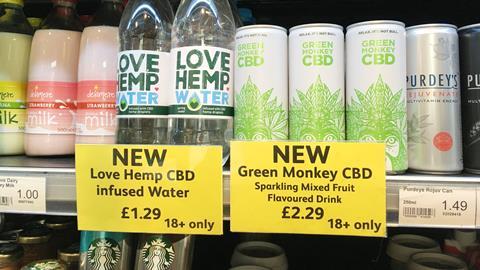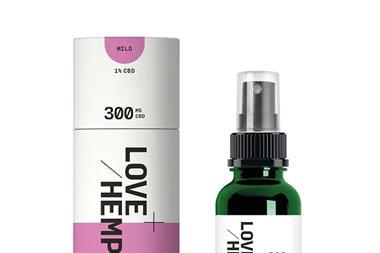As pandemic-weary Brits prioritise health and wellness, CBD brands are punching above their weight in grocery.
Take Love Hemp, the CBD brand backed by two-time world heavyweight boxing champion and Olympic gold medallist Anthony Joshua. It today reported profits of £1.3m in the year ended 30 June 2021 (up from £96k in 2020) and revenues of £4.3m (up from £2.7m).
In November 2021, revenues from major retailers including Boots and Holland & Barrett were up 65%, compared with the average monthly revenue from retailers in the previous 10 months, Love Hemp said.
It comes after a recent industry report revealed sales of CBD products will likely hit £690m in 2021 – an increase of £314m since 2019.
But while demand for CBD is undoubtedly booming, it’s still a risky game for retailers and brands. Because, while the number of CBD food and drink products on sale in the UK has proliferated in recent years, none have yet been formally approved for sale by the Food Standards Agency.
And the regulator last week hinted at plans to increase enforcement action in the UK, with CEO Emily Miles urging brands and retailers to “act responsibly when marketing and selling these products”.
The big challenge for retailers is that they still don’t know which products are likely to gain approval.
In an update to the FSA Board last week, Miles admitted the approval process was taking longer than expected due to the lower-than-anticipated quality of applications for novel food status received by the deadline of 31 March 2021.
The FSA had received a “large number” of applications, she said, but only around 210 – connected to several thousand products – were viable for further consideration.
Of those, just four have passed the initial validation stage, meaning formal scientific assessment can commence. For the rest, further information is needed before the application can be progressed.
The FSA has already published a public list of products that have passed the initial validation stage and hopes to add to it in the coming months. It will also publish a list of products for which it is awaiting further information but has a “reasonable expectation” that info will be provided in a timely manner.
Once those lists are published, the industry will have to act quickly to remove non-compliant products from shelves, with plans to step up enforcement action immediately.
However, the FSA stressed that even the products on those two lists, which are considered “credible applications”, have not been formally authorised for sale. So, while they will “not be prioritised for enforcement action” at the moment, that could change if they are subsequently rejected from the authorisation process.
All in all, it leaves a huge air of uncertainty hanging over the CBD sector in the UK. But what is certain is that the FSA is making compliance a priority in the year ahead, and it won’t be pulling any punches.

View full Profile
























No comments yet